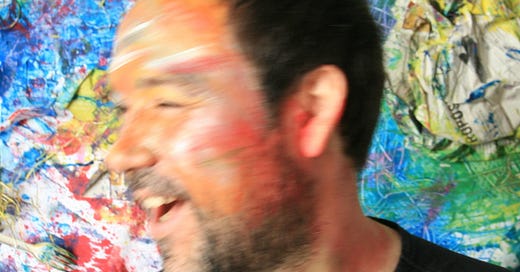Puigdemont Was the Bad Guy: The Collapse of Catalonia's Independence Dream
Chronicle published in December 2017, in the aftermath of the Catalan Parliament's failed independence declaration."
When I arrived at the Parliament bar around half-past four in the afternoon, I could already see that the battle was lost. The ERC boys walked around with their heads down, avoiding my gaze.
There’s a way of asking for forgiveness that is almost a way of saying goodbye. I’ve come across it before. I’ve seen it at university, in bars and restaurants, even in my own bed.
There comes a moment when people hit their limit and are left exposed, defenseless before what they believe themselves to be. You canʼt ask a zebra to act like a tiger or a hen to fly like a bird of prey.
A lizard canʼt bite like a crocodile. Man has infinite potential for transformation because he is a creative being, but overcoming obstacles requires mastering fear and maintaining strength of spirit—the engine of both genius and talent.
Under stress, most people lose hope and become more docile and obedient than animals. Pigs, when slaughtered, scream, resist, try to escape. Victims of mass executions disconnect and wait peacefully for their turn.
I greeted Carles Campuzano, leader of PDCat, the centre-right party of the so-called moderate independence movement. Unlike the ERC boys, he was lively. I also noticed one of Artur Masʼs men, from Junts pel Sí, the governing party. It amused me to see him striding around with the self-confidence of a turkey in December, just before the Christmas feast.
Former minister Rigau spotted me and called out. "Enric!" She had dressed up for the occasion—an elegant but flashy outfit, like a modern Tory, which made her look younger. "Donʼt make the mistake of your life," I told her. But she didnʼt listen. She hugged me like a teenager bumping into a friend at a nightclub.
I saw that Minister Ponsatí was dragging herself around like a lost soul. The night before, she had been the only one left defending an American-style declaration of independence—solemn, immediate in effect, something that would bring people onto the streets to celebrate and protect it. "You all know there will be no dialogue, and in a few months, at best, weʼll be exactly where we are now but weaker," she had warned at the last government meeting.
Even she hadnʼt expected the PDeCAT leadership to water down, with Junquerasʼs acquiescence, the text the government had agreed on with the CUP. By the time the parliamentary session was about to begin, we learned that Anna Gabrielʼs people had just been informed that President Puigdemont had no intention whatsoever of declaring independence—not even as an insinuation.
The session was postponed. Once youʼve given in on the fundamentals, they can make you swallow anything, I thought, recalling some CUP membersʼ tweets from the day before. We stepped outside to smoke in the courtyard bar.
"I donʼt get it," a friend said. "What do they gain from this maneuver?" "Going back to the old ‘deal and compromiseʼ game, or dying trying."
"But why? Itʼs so stupid. Even my grandmother will vote for the CUP now!"
"It has nothing to do with intelligence. Itʼs just their nature—they donʼt know how to do anything else. Just as ERC only knows how to complain about Mas and bow to his strategies, they only know how to do this. Independence is too big for them, so theyʼd rather endure a long march through the desert, even if it means some of their own getting disqualified, fined, or arrested, so they can keep playing the victim, like they always have."
Itʼs no coincidence that many Jews who survived the concentration camps ended up committing suicide after they were liberated. Behaviors that seem reasonable within a certain context take on a different meaning when circumstances change. Thatʼs why some people cling to the past and reject freedom, even when itʼs handed to them on a silver platter.
Little by little, I realized that the famous Article 155 was the same as Puigdemontʼs discourse. Spain cannot exercise violence clearly and directly against Catalonia without exposing that Catalonia is, in fact, a nation—an occupied and repressed one at that. It needs some Catalans to do its dirty work, to muddy the waters of the conflict with contradictions and Byzantine arguments.
Thatʼs what failed in the referendum. If not for the police intervention, Catalans would have realized just how improvised the governmentʼs organization had been, and Junts pel Sí would have fallen into crisis. But the police paralyzed the entire autonomous government structure and forced Catalans to choose: stay home or go out and defend the country.
A referendum that was meant to be a folkloric mobilization turned into a national revolt. The success was so overwhelming that the autonomists had to spend a week dwelling on police violence, showing images of bloodied heads, reviving the ghosts of Francoism and the Civil War, creating an atmosphere that would push Puigdemont into giving in to pressure.
When we walked into the auditorium to listen to the speech, I got a message: "In the end, it didnʼt turn out so bad." I ignored it. I already knew that part of the political class had committed suicide, no matter what happened. My phone exploded with messages. Friends I hadnʼt heard from in years were writing, furious. They called the government insane, incompetent, and treacherous.
"Between Barcelona and Madrid, the conditions for a perfect storm are brewing," a friend told me.
"Theyʼre steering us toward a major collapse—not for Cataloniaʼs freedom, but in a way that makes it look like itʼs the Catalansʼ fault. Just like in 1936," I replied. "At least this time, we see it coming."
On my way home, Víctor Puig texted me: "@KRLS is a genius." "And Catalonia is surreal," I shot back, smiling.



